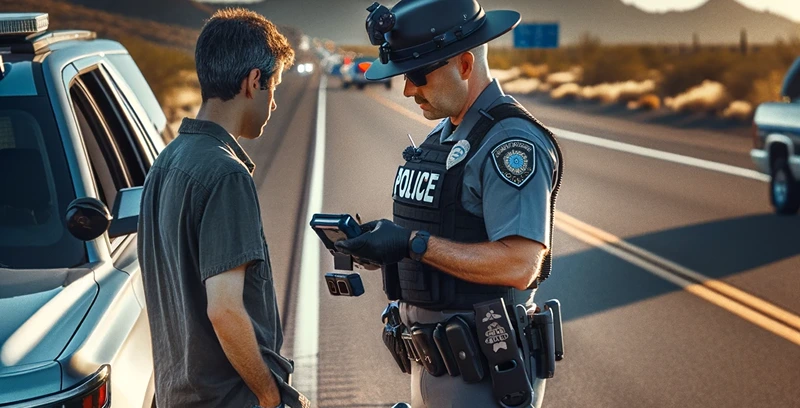DUI Vehicular Manslaughter Charges in Arizona

If you have been charged with vehicular manslaughter due to a DUI in Arizona, you need the expertise of a skilled vehicular manslaughter lawyer like Josh Kolsrud from Kolsrud Law Offices.
Driving under the influence and vehicular manslaughter charges can have serious consequences, including hefty fines, license suspension, and even jail time.
If you or a loved one is facing DUI or vehicular manslaughter charges in Arizona, don't hesitate to seek legal representation. Contact us today to schedule a consultation with Josh Kolsrud and his team to get started on building a strong defense.
Vehicular Manslaughter Laws in Arizona
In Arizona, vehicular manslaughter is addressed under the broader category of manslaughter, as defined in Arizona Revised Statutes (A.R.S. § 13-1103).
This statute encompasses various circumstances under which a person can be charged, including causing death through reckless actions.
Reckless driving behaviors that could lead to vehicular manslaughter charges include:
➤Excessive speeding or aggressive driving.
➤Driving under the influence of alcohol or drugs.
➤Engaging in dangerous driving behaviors like racing.
Manslaughter, including cases involving vehicles, is classified as a Class 2 felony in Arizona, illustrating the gravity of such offenses. The state's legal system demands that for a conviction, it must be proven beyond a reasonable doubt that the individual's reckless conduct directly resulted in the death of another person.
Manslaughter Penalties
In Arizona, the penalties for a Class 2 felony, including manslaughter as per Arizona Revised Statutes (A.R.S. § 13-1103), can vary based on several factors, including the presence of aggravating or mitigating circumstances and the defendant's prior criminal record. According to Arizona law, specifically outlined under A.R.S. § 13-702, A.R.S. § 13-703, and A.R.S. § 13-704, the sentencing range for a Class 2 felony is as follows:
- Standard Sentencing:
- For a first-time offender, the range of imprisonment is typically 4 to 10 years.
- The presumptive sentence, or the starting point for sentencing, is 5 years.
- Mitigated and Aggravated Sentencing:
- If mitigating factors are present, the sentence can be reduced to as little as 3 years.
- Conversely, if aggravating factors are identified, the sentence can be increased up to a maximum of 12.5 years.
- Repeat Offenders:
- For individuals with one prior allegeable felony conviction, the sentencing range increases to 4.5 to 23 years, with a presumptive sentence of 9.25 years.
- For those with two or more prior allegeable felony convictions, the range is significantly higher, from 10.5 to 35 years, with a presumptive sentence of 15.75 years.
| Penalty Type | Details |
|---|---|
| Standard Sentencing (First Offense) | 4 to 10 years imprisonment, presumptive 5 years |
| Mitigated Sentencing | As low as 3 years imprisonment |
| Aggravated Sentencing | Up to 12.5 years imprisonment |
| Repeat Offender (One Prior Conviction) | 4.5 to 23 years imprisonment, presumptive 9.25 years |
| Repeat Offender (Two or More Prior Convictions) | 10.5 to 35 years imprisonment, presumptive 15.75 years |
| Additional Penalties | Fines, probation, restitution, loss of civil rights |
Remember, these sentencing ranges are guidelines, and the actual sentence can vary based on a wide range of factors.
An experienced defense attorney can provide more detailed information based on the specifics of a case and can work to mitigate the severity of the penalties. It's also important to note that additional penalties, such as fines, probation, and restitution, may apply beyond the prison sentence itself.

DUI Law
In Arizona, DUI laws are designed to prevent driving under the influence of alcohol or drugs due to the significant risk this poses to public safety.
The state has established specific blood alcohol concentration (BAC) thresholds and substance standards to legally define what constitutes driving under the influence. Below, we'll break down the various types of DUI charges under Arizona law.
➤Standard DUI
- Statute: Arizona Revised Statutes (A.R.S. § 28-1381)
- Definition: Operating a vehicle with a BAC of 0.08% or higher (0.04% for commercial vehicle drivers).
- Penalties: For first-time offenders, penalties can include at least 10 days in jail, fines and surcharges, mandatory alcohol education, possible community service, and installation of an ignition interlock device on the vehicle.
➤Extreme DUI
- Statute: A.R.S. § 28-1382
- Definition: Operating a vehicle with a BAC of 0.15% or higher, within two hours of driving.
- Penalties: Increased penalties from a standard DUI, including at least 30 days in jail, higher fines, and longer ignition interlock requirements.
➤Super Extreme DUI
- Statute: A.R.S. § 28-1382
- Definition: Operating a vehicle with a BAC of 0.20% or higher, within two hours of driving.
- Penalties: Even more severe than extreme DUI, penalties include at least 45 days in jail, substantial fines, and extended ignition interlock device requirements.
➤Aggravated DUI
- Statute: A.R.S. § 28-1383
- Definition: A DUI charge becomes "aggravated" under certain circumstances, such as committing a third DUI offense within 84 months, driving under the influence when one's license is suspended or revoked, driving under the influence with a passenger under 15 years old, or refusing to submit a BAC test while having an ignition interlock device requirement.
- Penalties: Aggravated DUI is a felony charge, which can result in substantial prison time, loss of driving privileges for an extended period, fines, mandatory alcohol or drug treatment programs, and other severe consequences.
Drug DUI
- Statute: A.R.S. § 28-1381
- Definition: Operating a vehicle while under the influence of any illegal drugs or prescription medications that impair the ability to drive.
- Penalties: Similar to alcohol-related DUI charges, penalties can include jail time, fines, mandatory drug education or treatment programs, community service, and possible vehicle impoundment.
Defenses to DUI Vehicular Manslaughter
Facing DUI and vehicular manslaughter charges in Arizona demands a strategic legal approach, focusing on the specifics of each case. Below are common defenses used in these types of cases:
- Disputing BAC Test Accuracy: Attacking the validity of Blood Alcohol Content testing methods, including the maintenance and operation of testing devices, as well as the timing of the tests.
- Proving Lack of Impairment: Demonstrating through witness testimony or other evidence that the defendant was not actually impaired at the time of the incident.
- Contesting Causation: Arguing that other factors, such as mechanical vehicle issues or actions of another driver, were the primary causes of the accident, not the defendant’s alleged impairment.
- Presenting Mitigating Circumstances: Highlighting factors such as a lack of previous criminal history, the defendant’s character, or unusual circumstances that led to the event, which might reduce the perceived severity of the offense.
A skilled attorney can leverage these defenses to work towards minimizing the consequences of DUI and vehicular manslaughter charges. Engaging legal counsel early is important to ensure a comprehensive defense strategy.
Contact us today to schedule a
FREE CONSULTATION and learn
how we can help you.
Frequently Asked Questions (FAQs) on DUI and Vehicular Manslaughter in Arizona
What constitutes vehicular manslaughter in Arizona?
Vehicular manslaughter in Arizona, as outlined under ARS 13-1103, occurs when reckless behavior, such as driving under the influence, leads to the death of another person. This "reckless behavior" is defined as actions that pose a substantial and unjustifiable risk to others.
How can a DUI attorney help if I'm charged with DUI in Arizona?
A DUI attorney can provide critical assistance if you're charged with DUI by evaluating the evidence, challenging the legality of the traffic stop, questioning the accuracy of BAC tests, and developing a tailored defense strategy based on Arizona DUI law.
What are the penalties for Arizona vehicular manslaughter?
The penalties for vehicular manslaughter under Arizona law can include long-term imprisonment, significant fines, and loss of driving privileges, reflecting the gravity of causing the death of another person through reckless driving.
Can being under the influence lead to a manslaughter charge in Arizona?
Yes, driving under the influence can lead to a vehicular manslaughter charge if the impaired driving results in a fatal accident.
What should I look for in a vehicular manslaughter attorney?
When looking for a vehicular manslaughter attorney, consider their experience with manslaughter cases, knowledge of Arizona law, track record in handling serious criminal charges, and their approach to defense in cases involving the death of another person.
What defenses are available in a DUI defense case in Arizona?
In a DUI defense case, possible defenses might include challenging the validity of the traffic stop, disputing the accuracy of BAC readings, or arguing that there was no substantial and unjustifiable risk posed by the defendant’s actions.
How does Arizona law define manslaughter, and how does it apply to DUI cases?
Under Arizona law, particularly ARS 13-1103, manslaughter involves recklessly causing the death of another person. In DUI cases, if the driver's actions are deemed reckless and lead to a fatal accident, this can qualify as manslaughter.
What is the difference between homicide and manslaughter in Arizona, and how does DUI fit into this?
Homicide in Arizona encompasses different levels of unlawful killing, including murder and manslaughter. Manslaughter, differentiated by the lack of premeditation and presence of reckless behavior, can include cases where DUI leads to someone’s death.
How serious is a charge for vehicular manslaughter under the influence in Arizona?
A charge for vehicular manslaughter under the influence is extremely serious in Arizona, as it combines severe criminal charges for both the DUI crime and the resulting death.
What factors do courts consider in a manslaughter case stemming from a DUI in Arizona?
Courts consider factors such as the level of recklessness, the defendant’s BAC at the time of the accident, previous DUI convictions, and the specific circumstances that led to the death of another person in manslaughter cases stemming from DUI.
Facing Charges? Kolsrud Law is Here to Help
At Kolsrud Law Offices, Josh Kolsrud has an extensive background in handling serious criminal cases, including those involving vehicular manslaughter and DUI. With a history of over 3,500 cases and more than 100 jury trials, Kolsrud brings significant experience and a commitment to providing quality legal counsel.
If you're facing charges and need assistance, Kolsrud Law Offices offers a free initial consultation. You can contact them via email at Josh@KolsrudLawOffices.com or call for a free consultation at (602) 638-3790
An award-winning criminal defense attorney Since 2006
Why Choose Josh Kolsrud
With over 100 trials to his name, and years of experience as a state and federal prosecutor, Josh understands the law, the legal process, and your rights. Josh is also committed to representing every client with utmost integrity and dedication
Experience
Josh has prosecuted major crimes on the state and federal level, led a successful anti-human sex trafficking operation that saved lives, and argued before countless juries and justices for his clients
Expertise
Josh is an expert in both Arizona and federal criminal law, and is ready to put that expertise to work for you.
Dedication
As a prosecutor, Josh saw far too many defendants lose their livelihood due to poor representation. Josh will always give every client his complete attention and effort
Get a Free Initial Consultation:
Complete our form below to get a free case review.
or call us at (480) 999-9444.
